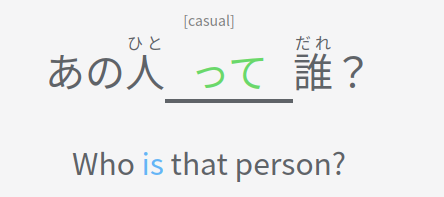English translator:
-, as for
Structure:
Sentence topic + って

Highlighting the verb “is” in the English translation is very misleading. It doesn’t feel like the requested answer is a topic marker at all. It feels more like the requested answer is a verb or だ・です.

The Grammar point for は (https://bunpro.jp/grammar_points/3) was much more clear: “As the topic of this sentence”.
Could we use something like “As the topic of this sentence (casual)”?
@shary
Hey 
I agree that highlighting “is” might have been misleading so I have changed the translations to be a bit more literal.
I hope it won’t be too easy though! 
Cheers!
Maybe I’m missing something, but:
スマホって 高くないですか?
As for smartphones, they are expensive, aren’t they?
Shouldn’t it be “高いですか”? If not, how would you translate “As for smartphones, they are not expensive, are they?”?
スマホって 高くないですか?
Smartphones, are they not expensive?/aren’t they expensive?
(Almost in a rhetorical way, like speaker already knows or suspects they are indeed expensive )
スマホって 高いですか?
Smartphones, are they expensive?
(Sounds like they genuinely don’t have any clue whether they are cheap or not)
I would expand but it’s 2 am and I’m tired lmao hope this helps so last a little bit
I see, the question tag carries the negative form, so it’s just that the translation is a bit loose. Question answered, thank you very much. 
You can use スマホって高くなくない? to mean “Aren’t smartphones inexpensive?” ない with rising intonation is often used, without a particle, in casual speech merely to indicate a question (and is overwhelmingly the commonest pattern for invitations). Also 高くないじゃない?
With a touch more distance, スマホって高くなくないですか?
You can also nominalize the relative clause with の or, more casually, ん:
スマホが高くないんじゃない?This is like “Isn’t it that…” and would be very likely if e.g. their cheapness was the cause of something you were just talking about.